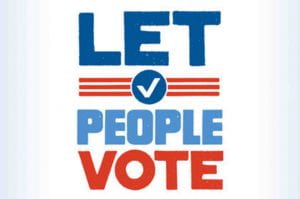 Written by Benjamin Clanton, Government Publications
Written by Benjamin Clanton, Government Publications
The expansion of voting rights has a long and tumultuous history in the United States, and while the journey is not over (and may never be), a number of crucial events have made voting a more inclusive right that many people cherish as one of the most important responsibilities held by American citizens. The original text of the U.S. Constitution largely left decisions concerning voting rights up to the individual states; thus, the right to vote was held almost exclusively by white male property holders in the early days of our nation. However, several Constitutional Amendments have expanded the electorate since the American Civil War. In the years immediately following the war, the Fourteenth Amendment extended the vote to all males above the age of 21 and further defined citizenship rights, and the Fifteenth Amendment seemingly outlawed the denial of voting rights based on race and “conditions of previous servitude,” laying out protections for former male slaves. In 1920, the Nineteenth Amendment extended the vote to women, a long overdue protection finally given after a decades long struggle.
The 1960s witnessed a new era in the protection of voting rights, particularly for minorities in certain parts of the country. States in the American South, following Reconstruction in the late 19th century, long practiced efforts to disenfranchise African American voters through things such as a poll tax and literacy tests. In 1964, the Twenty-fourth Amendment outlawed the use of poll taxes, and the following year, the Voting Rights Act of 1965 laid out protections for minority voters, working to realize the promises made by the Fourteenth and Fifteenth Amendments. The Voting Rights Act has been amended several times over the past half century, extending protections to other minorities in the United States, including language minorities and voters with disabilities. Another important step to bring more people into the political conversation took place in 1971 with the Twenty-sixth Amendment, which lowered the voting age to 18 nationwide.
There are many other important moments and pieces of legislation that serve to protect voting rights in the United States, and I would encourage further research if you are interested in both the high and low points of this part of the nation’s history. The protection of voting rights in the United States continues to be a pertinent topic in our society, and will likely remain so well into the future. There are a number of questions that arise during every election cycle. Are there enough polling places to accommodate the population, particularly in urban areas? What exactly is the future of early voting and mail-in voting, both exacerbated by the ongoing Covid-19 pandemic? What about the disenfranchisement of felons in many states, either while incarcerated or after release? Should a person have to show identification to vote? One would hope that voting, one of the most sacred rights held by American citizens, one that countless people have fought for during the history of this country, will continue to become easier, with more and more people encouraged to use this opportunity to have their voices heard.
And this brings a reminder: please vote! It is such a privilege to be able to do so. It is important to keep up with what is happening on any given ballot. Many people only consider a Presidential election important. But there are so many elections that happen in conjunction with and in between it. Even in a year such as this one, there are other relevant things on the ballot one should be knowledgeable about. For example, as a Mississippian, I get the chance to vote on the following on November 3: President of the United States; members of the U.S. Congress; state Supreme Court justices; a new design for our state flag; and the possible legalization of medical marijuana. So, remember, being a voter is important, but being an informed voter is vital.
If you are interested in more information on voting rights, here are some links to online government resources that you can check out!
- Department of Justice – History of Voting Rights Laws
- USA.gov – Voting and Election Laws
- Library of Congress – Voting Rights for Women
- U.S. House of Representatives – Electoral College Fast Facts
- U.S. House of Representatives – Constitutional Amendments and Major Civil Rights Acts of Congress (great info on Amendments and Acts that protect the voting rights of minorities)
- USA.gov – Presidential Election Process
- The White House – Information about every President
- National Archives – The Constitution: Amendments 11-27
- National Archives – Congress and the Voting Rights Act of 1965